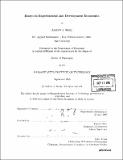Essays in experimental and development economics
Author(s)
Healy, Andrew J
DownloadFull printable version (19.33Mb)
Other Contributors
Massachusetts Institute of Technology. Dept. of Economics.
Advisor
Esther Duflo.
Terms of use
Metadata
Show full item recordAbstract
This thesis is a collection of three essays on economic development and experimental economics. In Chapter 1, I present experimental evidence about how Thais treat information from domestic and foreign sources. Thai students answer a series of objective general-knowledge questions, both before and after observing answers given by American students and other Thai students. By looking at how subjects update their original answers after observing information, it is possible to estimate the weights that subjects assign to themselves, the American answers they see, and the Thai answers they see. Consistent with previous studies, I find that Thais exhibit a significant level of overconfidence in that they overweigh their initial answers. Despite their overconfidence, the relative weight that they give to answers given by Americans compared to answers given by other Thais is, in most instances, statistically indistinguishable from the optimal solution. Moreover, the experimental design allows me to distinguish between two possible explanations for this fact. Under one hypothesis, subjects overestimate the relative precision of American answers, but fail to recognize the value of independence, and the two errors cancel each other out. Under a second hypothesis, subjects recognize the relative accuracy of each group and appreciate the value of independence. (cont.) The data rejects the first hypothesis and supports the second. In Chapter 2, I report the results of an experiment that tests for the presence of an information endowment effect. Experimental evidence suggests that an individual who is endowed with a coffee mug or chocolate bar demands a much higher price to sell than an unendowed person is willing to pay to acquire the same good. This study shows that a similar phenomenon does not exist when the endowment consists of information rather than goods. The results suggest that the endowment effect operates primarily on preferences as opposed to judgment. In Chapter 3, my co-author and I use econometric methods to create a data set that makes it possible to better identify what areas of Thailand are poor and unequal. We show the potential for our results to improve policies targeted at poor households.
Description
Thesis (Ph. D.)--Massachusetts Institute of Technology, Dept. of Economics, 2005. Includes bibliographical references.
Date issued
2005Department
Massachusetts Institute of Technology. Department of EconomicsPublisher
Massachusetts Institute of Technology
Keywords
Economics.